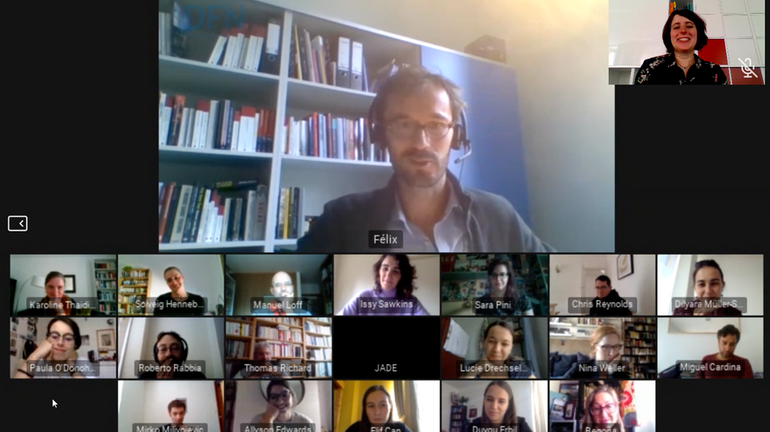Hosting academic events in pandemic times

From 9 to 11 September 2020, the first fully virtual academic workshop took place at ZOiS: Memory as a Dialogue? History for Young People. One week later, we sat down with organisers Nina Frieß and Félix Krawatzek to discuss the pros and cons of going virtual for an academic event.
Why did you decide to go fully virtual for this workshop?
Nina Frieß: When we started planning nobody intended to hold a virtual workshop. Seeing some travel restrictions persist, we thought about a hybrid event, but eventually needed to move online given the uncertainty around travel across Europe.
How did you prepare for this workshop?
Félix Krawatzek: We always wanted to foster an interdisciplinary dialogue btw. social sciences and humanities on memory and youth. Therefore, we formed small topic-based groups before the workshop. In these groups exchange took place based on rumination sheets and online.
NF: As a result, first feedback and interdisciplinary dialogue emerged early. Planned for an offline workshop, the practice turned out to be very useful for an online event. Panelists already knew each other and could jump right into the discussion.
What turned out to work well?
FK: Alongside the dialogue between panelists, we were very pleased with our virtual coffee breaks. We found a platform allowing you to move btw. several virtual tables to engage with different people. It helped create a really nice atmosphere.
What went surprisingly wrong?
NF: We had some unexpected technical challenges. The “share your screen” button just disappeared at times, for instance. Keeping the time limit for presentations turned out to be much more challenging than in real life events as one cannot show the usual please conclude sign but must instead interrupt.
What are your lessons learned for the next virtual workshop?
FK: The online format means more work for everyone involved. Intense preparation are needed beforehand to facilitate an exchange, in particular across disciplines and geographical areas of expertise.
NF: Test the platform you will use, test it again, again, and again. Have a backup platform to which one can easily move. Test this platform, test it again, again, and again. I would also ask my father to test it. If this turns out well, there is a chance everything is gonna be ok.
What was the most curious thing to happen during the virtual workshop?
FK: One participant informed us that we shouldn’t worry if he suddenly disappears, there was a fire at his place, adding “this happens to me the first time during a conference”. Fortunately, everything turned out to be fine.
Is there anything you would like to keep for the post-pandemic academic life?
NF: For young parents the online format makes participation easier. It would thus be great, if we could aim for hybrid events in the future as a contribution to the reconciliation of work and family life.